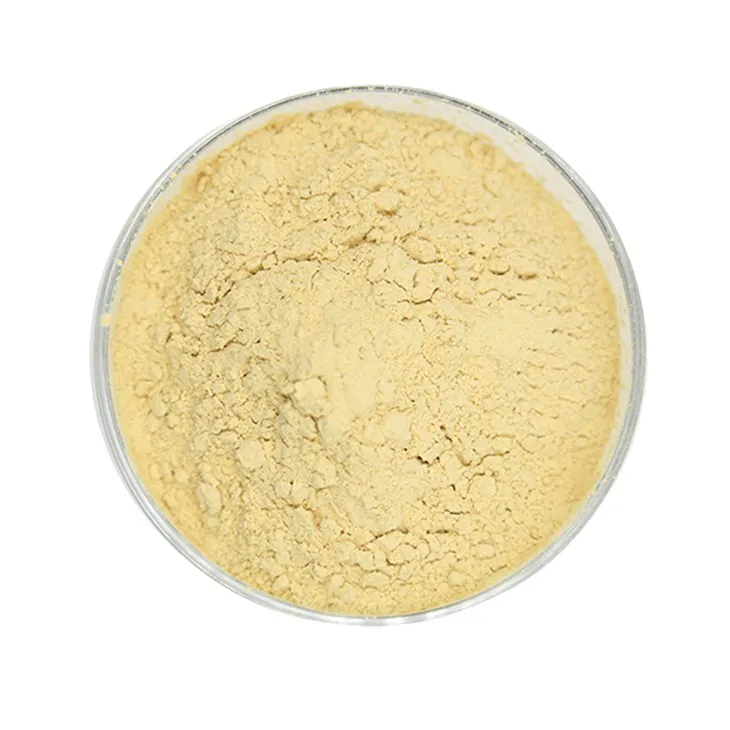- 0086-571-85302990
- sales@greenskybio.com
Genistein: Benefits and Consumption Guide
2024-11-12

1. Introduction to Genistein
Genistein is a type of phytochemical that is predominantly found in plants, especially in soybeans and soy - based products. It belongs to the class of isoflavones, which are known for their various health - promoting properties. Over the years, Genistein has gained significant attention in the scientific community due to its potential impact on human health.

2. Advantages of Genistein
2.1 Cancer Prevention
One of the most notable advantages of genistein is its potential role in cancer prevention. Multiple research studies have indicated that genistein can interfere with the growth and proliferation of cancer cells. It does this through various mechanisms. For instance, it may regulate the expression of genes involved in cell cycle control. By inhibiting certain enzymes and signaling pathways that are crucial for cancer cell survival and division, genistein can potentially slow down or even halt the development of cancer. In particular, it has shown promise in the prevention of breast, prostate, and colon cancers. However, it is important to note that while the research is promising, more in - depth studies are still needed to fully understand its effectiveness in a clinical setting.
2.2 Heart Health
Genistein also offers benefits for heart health. It has been associated with reducing cholesterol levels in the body. Specifically, it can lower LDL (low - density lipoprotein) cholesterol, which is often referred to as "bad" cholesterol. By reducing the levels of LDL cholesterol, genistein helps in decreasing the risk of plaque formation in the arteries, which is a major contributor to heart disease. Additionally, it may improve blood vessel function. It can enhance the relaxation of blood vessels, which in turn improves blood flow and reduces blood pressure. This dual action of reducing cholesterol and improving blood vessel function makes genistein a potentially valuable compound for maintaining a healthy heart.
2.3 Bone Health
Another area where genistein has shown positive effects is in bone health. It can act on bone cells, such as osteoblasts and osteoclasts. Osteoblasts are responsible for building new bone tissue, while osteoclasts are involved in breaking down old bone. Genistein appears to stimulate the activity of osteoblasts and inhibit the excessive activity of osteoclasts. This balance helps in maintaining bone density and strength, which is crucial for preventing osteoporosis, especially in post - menopausal women who are at a higher risk of bone loss.

3. Consumption of Genistein
3.1 Food Sources
Genistein is most commonly found in soy - based foods. Some of the rich sources include:
- Soybeans: These are a natural and concentrated source of genistein. They can be consumed in various forms such as cooked soybeans, which can be added to salads or used in stir - fries.
- Tofu: Made from soy milk, tofu is a popular soy - based product that contains a significant amount of genistein. It can be used in a wide variety of dishes, from soups to main courses.
- Soy Milk: A dairy - free alternative to regular milk, soy milk is not only a good source of genistein but also provides other nutrients like protein and calcium.
- Miso: This fermented soy product is used in Japanese cuisine, typically in soups and sauces, and contains genistein along with other beneficial compounds.
3.2 Supplements
In addition to food sources, genistein is also available as a supplement. These supplements come in different forms such as capsules, tablets, and powders. However, when considering genistein supplements, it is crucial to be cautious.
3.3 Dosage
Recommended Dosage from Food Sources: For those who obtain genistein from a normal diet rich in soy - based foods, there is no specific recommended dosage as it varies depending on individual dietary patterns. However, consuming a moderate amount of soy - based foods on a regular basis can provide a sufficient intake of genistein. For example, having a serving of tofu or a glass of soy milk a few times a week can contribute to the overall genistein intake.
Recommended Dosage for Supplements: When it comes to genistein supplements, the recommended dosage can vary depending on the purpose of use and individual factors. In general, dosages in the range of 50 - 100 mg per day have been studied in some research. However, it is essential to consult a healthcare provider before starting any supplement regimen, as they can take into account factors such as age, gender, existing health conditions, and potential interactions with medications.

4. Potential Side Effects
While genistein has many potential health benefits, it is also important to be aware of its potential side effects.
4.1 Hormonal Effects
Genistein has estrogen - like properties. In some cases, this may lead to hormonal imbalances, especially in individuals with pre - existing hormonal disorders. For example, it could potentially affect the menstrual cycle in women or have an impact on hormonal levels in men. However, the extent of these effects is still being studied, and in normal dietary intakes from soy - based foods, the likelihood of significant hormonal disruption is relatively low.
4.2 Digestive Issues
Some people may experience digestive issues when consuming large amounts of genistein, either from supplements or excessive consumption of soy - based foods. These can include symptoms such as bloating, gas, and abdominal discomfort. To avoid such issues, it is advisable to start with small amounts and gradually increase the intake, especially when introducing new soy - based products or starting a supplement.

5. Interactions with Medications
Genistein may interact with certain medications, so it is crucial to be aware of these potential interactions.
5.1 Anti - Cancer Medications
Since genistein has its own potential anti - cancer effects, it may interact with prescribed anti - cancer medications. For example, it could potentially enhance or interfere with the action of chemotherapy drugs. Therefore, if a patient is undergoing cancer treatment, they should consult their oncologist before taking genistein supplements or significantly increasing their soy - based food intake.
5.2 Blood - Thinning Medications
Genistein's effects on blood vessels and blood flow may interact with blood - thinning medications such as warfarin. It could potentially increase the risk of bleeding if not properly monitored. Patients on blood - thinning medications should have their blood clotting parameters regularly monitored if they also consume genistein - rich foods or supplements.
5.3 Hormone Replacement Therapy
For individuals on hormone replacement therapy (HRT), genistein's estrogen - like properties may interact with the hormones being administered. This could lead to unexpected changes in hormonal levels and potentially affect the effectiveness of the HRT. It is essential for these individuals to discuss with their healthcare provider whether genistein - containing foods or supplements are suitable for them.
6. Conclusion
Genistein is a phytochemical with a wide range of potential health benefits, particularly in the areas of cancer prevention, heart health, and bone health. However, when considering consuming genistein, whether from food sources or supplements, it is important to be aware of the proper dosage, potential side effects, and possible interactions with medications. By following these guidelines and consulting with a healthcare provider when necessary, individuals can potentially reap the benefits of genistein while minimizing any associated risks.
FAQ:
What is Genistein?
Genistein is a phytochemical. It is found in certain plants and has been recognized for its various health - related properties, such as potential roles in cancer prevention, heart health improvement, and bone health enhancement.
How does Genistein prevent cancer?
Genistein can interfere with cancer cell growth and proliferation. It likely does this through multiple mechanisms at the cellular level, although the exact details are still being studied. By affecting cancer cells in this way, it shows potential as a preventative agent against cancer.
What are the benefits of Genistein for heart health?
For heart health, genistein may help in reducing cholesterol levels. High cholesterol is a risk factor for heart disease. Additionally, it can improve blood vessel function, which is important for maintaining good cardiovascular health.
How does Genistein contribute to bone health?
The exact mechanisms are still being investigated, but studies have associated genistein with improved bone health. It may interact with cells and processes in the bones to promote their strength and integrity.
What are the forms of Genistein - containing products?
There are genistein - containing foods and supplements. Foods that contain genistein include some legumes like soybeans. Supplements are also available in the market, which are designed to provide a concentrated dose of genistein.
What should be noted about the dosage of Genistein?
The proper dosage of genistein depends on various factors such as age, gender, and overall health. It is important to follow the recommended guidelines. Taking too much genistein may lead to potential side effects, so it is crucial to consult a healthcare provider before starting any genistein supplement regimen.
Are there any side effects of Genistein?
Yes, there may be potential side effects. Some people may experience digestive issues or hormonal imbalances. However, these side effects are not common and are more likely to occur with excessive consumption or in certain individuals with pre - existing health conditions.
Can Genistein interact with medications?
Genistein may interact with certain medications. For example, it could potentially affect the efficacy of drugs that target hormones or cholesterol. It is essential to inform your doctor if you are taking genistein - containing products, especially if you are on other medications.
Related literature
- Genistein and its Impact on Health: A Comprehensive Review"
- "The Role of Genistein in Cancer Prevention: Current Research"
- "Genistein and Heart Health: Mechanisms and Clinical Implications"
- ▶ Hesperidin
- ▶ Citrus Bioflavonoids
- ▶ Plant Extract
- ▶ lycopene
- ▶ Diosmin
- ▶ Grape seed extract
- ▶ Sea buckthorn Juice Powder
- ▶ Fruit Juice Powder
- ▶ Hops Extract
- ▶ Artichoke Extract
- ▶ Mushroom extract
- ▶ Astaxanthin
- ▶ Green Tea Extract
- ▶ Curcumin
- ▶ Horse Chestnut Extract
- ▶ Other Product
- ▶ Boswellia Serrata Extract
- ▶ Resveratrol
- ▶ Marigold Extract
- ▶ Grape Leaf Extract
- ▶ New Product
- ▶ Aminolevulinic acid
- ▶ Cranberry Extract
- ▶ Red Yeast Rice
- ▶ Red Wine Extract
-
Nettle leaf extract
2024-11-12
-
Scutellaria Extract
2024-11-12
-
Medicinal Marshmallow Extract
2024-11-12
-
Propolis Extract Powder
2024-11-12
-
Konjac Powder
2024-11-12
-
Polygonum Cuspidatum Extract
2024-11-12
-
Dandelion Root Extract
2024-11-12
-
Hawthorn Extract
2024-11-12
-
Citrus bioflavonoids
2024-11-12
-
White mustard seed extract
2024-11-12





















